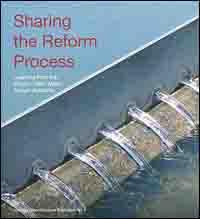Complete Title
Sharing the reform process : learning from the Phnom Penh Water Supply Authority (PPWSA)
Description
With a large percentage of the worlds population moving to urban areas, clean, affordable and timely supply of drinking and domestic water to its residents has become a priority. In most cities of the world, the primary responsibility of supplying drinking and domestic water lies with public utilities that often suffer from a series of ailments like poor cost recovery, poor and intermittent supply, and deficit budgets. In recent times significant efforts have been made to reform water utilities. This publication shares the reform process undertaken in Phnom Penh that has catapulted a war-torn dilapidated water utility into an efficient and profit making utility.
ISBN
978-2-8317-1289-5
Organization(s)
Imprint
Gland : IUCN; Phnom Penh : PPWSA, 2010
Physical Description
iv, 58p.
Notes
Includes bibliographic references
Monographic Series
Geographic keywords
Call number
More information 

Bibliographic level
Monograph/item
Physical medium
PDF
Number of library copies
0
Print availability status
Status unknown

